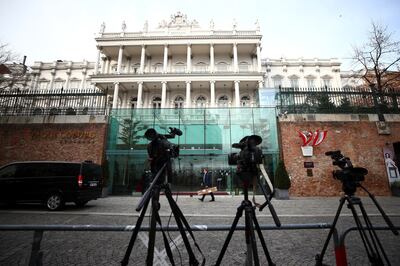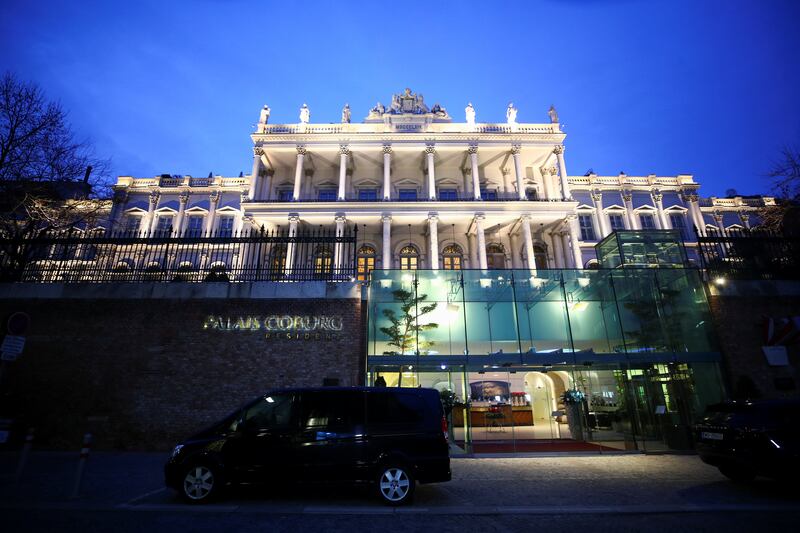Iran went into a new round of Vienna talks on reviving the 2015 nuclear deal asking for a mechanism to deliver the removal of US sanctions as European officials said they hoped for an agreement that would rein in Tehran's breakout nuclear activities.
Iran’s refusal to halt its nuclear programme is “undermining international security”, a spokesman for British Prime Minister Boris Johnson said on Monday as the talks resumed.
There has been growing concern that with Iran potentially a month away from developing enough uranium to make a bomb, a failure in the week-long talks in the Austrian capital would have severe security implications for the Middle East.
Negotiators met across the table in Vienna for the first time in five months after talks were delayed by elections in Iran and the appointment of hardline President Ebrahim Raisi.
A spokesman for Iran's Foreign Ministry said that its delegation in Vienna had “a firm determination to reach an agreement and is looking forward to fruitful talks".
The US has agreed to lift the hard “maximum pressure” sanctions imposed by Donald Trump after he withdrew from the nuclear deal in 2018, but Iran – which has declined to meet directly with the US negotiating team – has refused to co-operate unless sanctions are lifted without conditions.
Furthermore, it wants an apology for Mr Trump’s actions and guarantees that would make any future deal watertight against another US withdrawal.

Asked by The National what the British government hoped for from Vienna, Mr Johnson’s spokesman gave a warning about the increased threat.
“We recognise the challenges that Iran's nuclear programme has never been more advanced than today and that's undermining international security,” he said.
He called for a “swift conclusion” to negotiations with a “fair and comprehensive” deal on the table if Iran returned to “full compliance with its commitments”.
“If a deal is not swiftly concluded and Iran continues its nuclear escalation then they will be responsible for a missed opportunity and the collapse of the deal,” he said.
Russia’s envoy to the talks said Moscow was “cautiously optimistic”, despite being aware of the problems on the table.
Mikhail Ulyanov said “we have no reasonable and acceptable alternative to a successful conclusion of the talks” on the nuclear deal.
UK Foreign Secretary Liz Truss reminded Tehran that “all options are on the table” if the negotiations fail to strike a deal and stop it from building a nuclear bomb.
Ms Truss spoke as the pressure for an agreement intensified as Iran’s negotiators met with Western major powers, along with Russia and China, in an attempt to revive the 2015 Joint Comprehensive Plan of Action (JCPOA).
While intelligence estimates suggest Iran will be able to make a viable nuclear warhead with a missile delivery system possible in two years, if it enriches uranium to 90 per cent purity, the level required for bomb-making, a military response would be highly probable.
Israel, which has already conducted sabotage missions to delay this outcome, will almost certainly conduct air strikes using deep penetration weapons.
While the US would assist and potentially join Israeli attacks, Britain also appeared supportive following a meeting between Ms Truss and Israeli Foreign Minister Yair Lapid on Monday.
The pair announced an increased military collaboration, signing a memorandum of understanding in London on cybersecurity, defence and trade. Ms Truss said Britain would “work flat out to prevent the Iranian regime from gaining nuclear weapons”.
“We are absolutely determined to prevent Iran from securing a nuclear weapon and all options are on the table,” she said. “We want those talks to work but if they don’t work, all options are on the table.”
Mr Lapid, who will become Israel’s prime minister in two years, was even more direct, stating that if sanctions were lifted Iran would use the billions in extra income to further develop its bomb programme.
“The Iranians are coming to these talks for only one reason: to get sanctions lifted,” he said. “They need money for Hezbollah, for the Revolutionary Guards, for their global terrorist network and for the continued race towards nuclear weapons.”
He said a nuclear-armed Iran would push the Middle East into a nuclear arms race, putting the bomb in the hands of “religious fanatics who are engaged in terrorism as a way of life”.
With US sanctions severely harming its economy, Iran has claimed it is keen to strike a deal.







